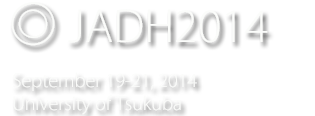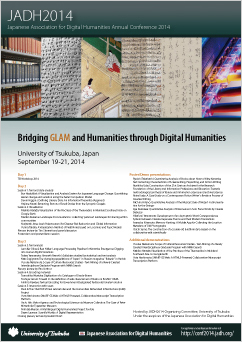Poster session 2
Construction of 21st Century Archives for the Research Foundation of the Library and Information Professions and Education: Towards a Methodological Synthesis of Library and Information Science and Archival Science
- Norihiko Uda (University of Tsukuba)
- Yuko Yoshida (University of Tsukuba)
- Tetsuya Shirai (University of Tsukuba)
We launched a project aimed to organize and create digital archives for library and information professions that will contribute to both research and education. The archive will comprise historical materials owned by the University of Tsukuba's Graduate School of Library, Information and Media Studies, which shaped the history of the education of library and information professions for most of the 20th century.
This project includes the formation of a comprehensive system for collecting and conserving materials and the implementation of a system for their utilization. The aims of this project are twofold: (1) to examine a methodological synthesis of library and information science and archival science and (2) to re-examine the history of the library and information professions and education.
Major users of the archives are library and information science researchers specialized in library and information professions and the history of librarianship. This system will establish a multilingual interface for international researchers who are interested in comparing professional development models of education for librarianship. Museum materials will be used for educational content on the history of media technology.
There are no precedents for a comprehensive archival system for the education of library and information professions that includes archival documents and museum documents. This archive thus has the potential to serve as an international model for knowledge-sharing on library and information science.
Six subordinate cross-disciplinary studies are in progress under the project. They comprise (1) A detailed examination of the collection and oral histories investigation, (2) Information architecture for digital archives, (3) Historical research on library and information professions and education, using archival materials, (4) Modeling, implementation and evaluation of the archive, (5) Modeling of the exhibition space, and (6) Analysis of the research project (museums, libraries and archives collaboration). This poster presentation focuses on studies in progress on (2) Information Architecture for digital archives and (3) Historical research on library and information professions and education, using archival materials.
The first study reconsidered “digital archives” to drive forward the project entitled “21st Century Archives for the Research Foundation of the Library and Information Professions and Education.” As a result, digital archives are defined as mapping of the original archives, holding to the principles of provenance, respect for the original order, preservation of the original forms of the archives, and permanent preservation. A real digital archive must be constructed based on an information architecture methodology.
Information architecture is the structural design of shared information environments; the art and science of organizing and labeling websites, intranets, online communities and software to support usability and findability. It involves analysis of information context and organization, labeling, navigation and retrieval using a consistent design philosophy. Information design prioritizes how information is presented on a website. Information architecture, on the other hand, is a website construction method that focuses on how to organize information elements. This study aims to achieve faithful mapping between the context of the original resources and electronic resources through the application of information architecture methodology to the establishment of digital archives.
In the second study, we adopted the methodology of digital humanities as our analytical scheme to clarify the historical development, current conditions, and future vision of the library and information professions and education. The materials in our archive collections for historical research of librarianship are periodicals, annual reports, minutes of meetings, syllabuses, business diaries, photographs, audio materials, video materials and films. They include unpublished and handwritten materials. Whatever their form, these materials are an aggregation of the memory of the philosophy of an institution and records of past activities. Previous studies have not included these materials due to their uncatalogued nature and often poor state of preservation.
We used two illustrative examples that utilize digital archive collections to demonstrate the progress of research. The first attempt was to trace the history of library and information professions focusing on changes in nominal designations of librarians/information professionals. The other was a consideration of the gender issue concerning female librarians, using digital images from the archive. These primary investigations have suggested the potential for reconstructing a discourse on the library and information professions and education.
- Keywords
- library and information science, archival science.

